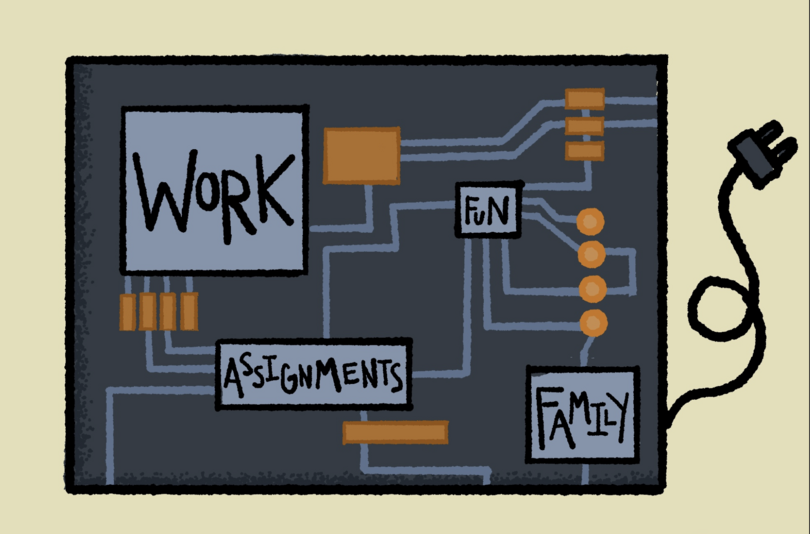Opinion: Reevaluate your reliance on technology after last week’s outage

The recent worldwide internet outage proved the generational dependence on social media and digital efficiency, our columnist writes. Conversely, the pause presented benefits for some, allowing students to decompress offline. Julia Rodenberger | Contributing Illustrator
Get the latest Syracuse news delivered right to your inbox.
Subscribe to our newsletter here.
I was trying to Venmo my friend on Oct. 20 when the payment failed several times. At first, I didn’t realize what was happening. An error read: “Venmo is currently encountering a disruption due to a cloud provider partner service issue.” Assuming it was my Wi-Fi, I refreshed, closed out the app and retried. But nothing worked.
In what felt like the longest 15 hours of the semester, millions of people worldwide faced an unexpected internet outage. Zoom meetings froze, messages failed to send and social media feeds stopped updating.
When I later opened TikTok, my For You Page was full of people’s posts reacting to the outage: complaints about Snapchat not loading or being unable to submit assignments on Canvas (used by other universities like Blackboard), jokes about missing Fortnite and lighthearted skits dramatizing the chaos.
Interestingly, a minority of posts suggested the break felt oddly refreshing, resorting to creative hobbies or picking up a book for the first time in years.
But for most students, the outage was less of a chance to “detox” and more a jarring reminder of just how dependent we are on technology. Syracuse University students, like others across the globe, rely on apps not just for socializing but for managing schoolwork, jobs, communication and daily logistics.
When these systems went down, even briefly, the disruption was enough to throw routines off balance and force students to improvise.
A 2023 National Library of Medicine found that college students check their most accessed app an average of 28 times per day, with their second-most accessed app 11 times per day. Such frequent usage demonstrates how integral these platforms have become, but also points to the excessive reliance on digital tools for nearly every task.
For SU students, this reliance takes on added weight.
As of fall 2024, roughly 20% of the student body are international students, and a large portion are from out of state or distant regions. For many, messaging apps, video calls and social media are more than conveniences – they’re lifelines to friends and family back home. When these platforms, such as Snapchat, Zoom and Microsoft Teams, went down, students temporarily lost access to not only their logistical tools, but also to support systems that play a vital role in their emotional well-being.
The reactions I saw on TikTok weren’t panic so much as impatience, with people complaining about their favorite apps not loading or dramatizing how “lost” they felt without them.
For students juggling classes, part-time jobs, extracurriculars and social obligations, apps aren’t just convenient – they are essential. Calendar reminders, group chat updates, academic platforms and delivery services keep schedules organized and daily responsibilities manageable. This deep reliance meant the internet outage wasn’t just a technological hiccup; it was a sudden, widespread blow to our daily organization.
By constantly prioritizing digital efficiency, many of us have subconsciously let our devices take over core tasks that our brains should be handling, like communication and time management.

Zoey Grimes | Design Editor
The sheer frustration over something as simple as a social media feed not loading proved that we have outsourced too much of our mental bandwidth to apps that were ironically designed to make life easier.
Still, the disruption wasn’t entirely negative. Some used the downtime as a rare chance to slow down and read, cook or spend time with friends. The outage served as a wake-up call that, while technology aids our daily life, it doesn’t have to control it. Moments of disconnection, however small, can create space to focus, reflect or simply breathe.
For college students with packed schedules, especially, this lack of balance is worth considering. Simple adjustments – printing backup assignments, arranging errands in advance or setting time aside to go offline – can help maintain the benefits of connectivity without letting technology dominate every aspect of life.
Ultimately, the internet outage was a minor disruption with a major lesson: our days are so reliant on digital tools they become controlling in ways we fail to realize. In posting memes and sharing complaints about our temporary “loss” of connectivity, we were collectively reminded that life continues beyond apps and notifications. Taking a step back, no matter how brief, offers a chance to reclaim control over how we spend our time.
The next time an app crashes or Wi-Fi fails, consider what it would mean to use that pause intentionally. Start a creative project, complete a task through physical means or simply utilize the time to take in the world beyond your screen. Technology is a powerful tool, but it’s most effective when it serves us rather than the other way around.
Addy Kimball is a freshman majoring in political science. She can be reached at akimba02@syr.edu.






